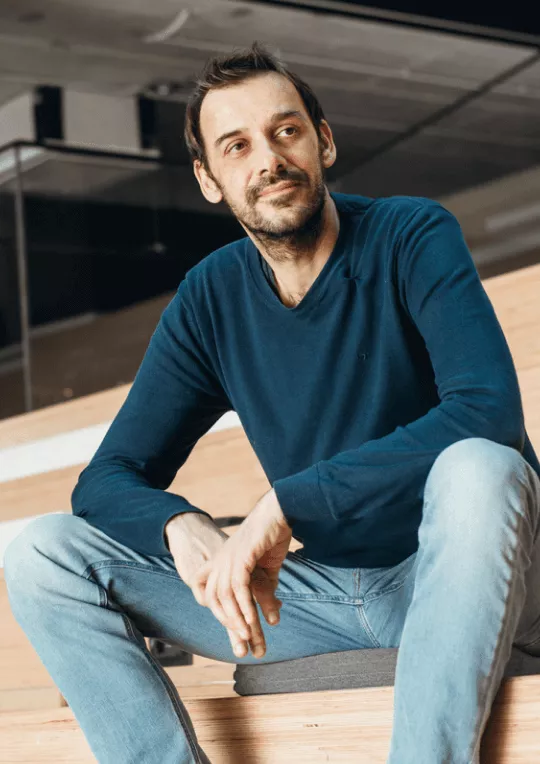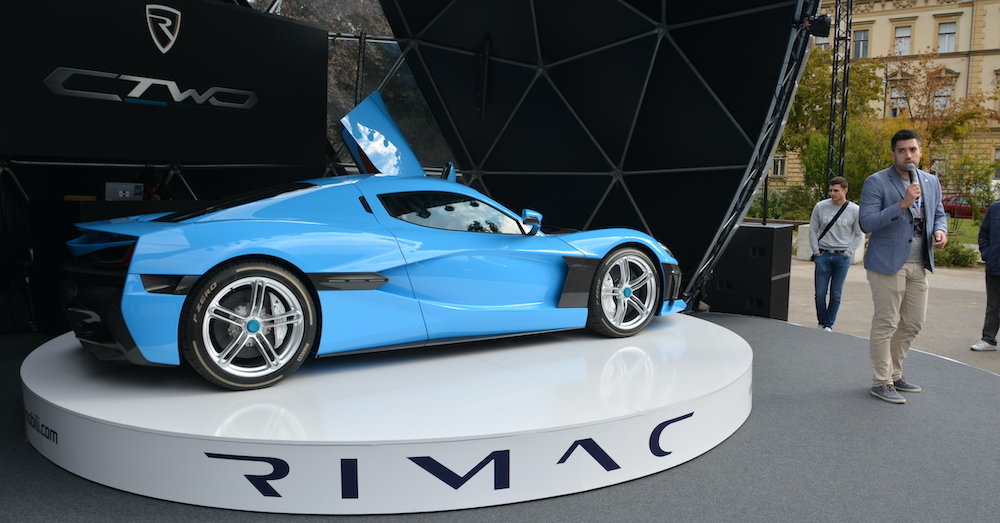(Editor’s note: This post on innovators and tech in Croatia is part of Dispatches’ Tech Tuesdays series. We cover tech because so many of our highly skilled internationals are entrepreneurs and engineers.)
When you (and by you I mean just about anyone) hears the word “Croatia”, you’ll likely think of rugged and mountainous scenery, a dramatic coastline, blue skies and an even bluer sea. You might also think of wine, and maybe – if you’re of a certain age – of war.
Do you ever think of tech? Of cars? Of software and innovation?
Probably not.
It goes without saying that Croatia’s place on the tourism map of Europe has allowed it to rest on its laurels. While its geographical position on the map certainly aids this country, it also comes with significant issues. If you’ve been paying any attention to the word “sustainable,” which keeps cropping up just about everywhere, you’ll know that this little country of less than four million inhabitants was buckling under the weight of its own popularity until the pandemic threw a spanner in tourism’s works.
The pause the pandemic forced Croatia to take made it take a long hard look at itself – at everything from gigantic cruise ships and their constant import of day trippers and pollution to illegal construction and monstrous hotels being carved like eyesores into the landscape.
In the post-pandemic world, we’re seeing the word “sustainable” everywhere, and I’m not just talking about saving the turtles by recycling plastic and using paper straws. Sustainable tourism has become a hot topic here in Croatia, with the pandemic having changed travel and tourism trends apparently permanently, shifting attitudes towards rural tourism, the involvement of local traditions and customs as well as local people, and leaving no trace, as it were.
While Croatia certainly needs to pay attention to tourism, given that it is by far the country’s strongest economic branch, accounting for a very significant lump of our GDP, it has so much more to offer, and one of those things is its blossoming IT and tech scene, as well as its general leaning towards innovation.
On to the main point – Croatia’s obsession with tourism, be it sustainable or not, has seen the powers that be fail to make the changes necessary for entrepreneurs and their ideas to flourish within the borders of the country.
While some of the more famous exceptions managed to remain in the country, it’s important to note that the one thing this country exports with no problem at all is its talent.
From doctors and scientists to inventors and engineers, huge numbers of educated and talented people (of which this little country produces an enviable amount), have flocked abroad to greener pastures where their skills and talent can be appreciated and nurtured instead of discouraged with often draconian rules, endless reams of red tape and attitudes reminiscent of quite another period of time.
Old habits die hard, but things in this regard are gradually altering, and the likes of Mate Rimac. That Rimac is bringing the attention and the money of the likes of Porsche and Bugatti to a nation which otherwise has no automotive industry to speak of is a clear indication of the winds of
change blowing.
I’m going to delve into just a few of the Croatian entrepreneurs and companies that are slowly changing the way the world sees this remarkable country.
Mate Rimac and Rimac Automobili
Mate Rimac, in the video above, is a dreamer and an incurable lover of cars. He set up his company, the now globally famous Rimac Automobili, way back in 2009 in his garage. This then single-person operation has turned into a highly respected employer of more than 1,000 people building electric supercars. This 35-year-old Croatian entrepreneur from Livno (Bosnia and Herzegovina) has been compared to Elon Musk, and his dogged determination has seen him manage to succeed beyond even his own wildest dreams in a country which is often hostile to such ventures.
Alongside Rimac Automobili, he is also the founder of Greyp Bikes, and eBike and eBike tech enterprise. At just 23 years old in 2011, Mate Rimac created the stunning Concept One, an electric supercar that can go from zero to 62 mph in a mere 2.5 seconds. He has since created even more supercars, including the astonishing Nevera (released in 2021), and attracted investment from Porsche, the Camel Group, Hyundai and more. In 2021, Rimac signed a joint operating agreement with Bugatti to form a next-generation supercar company.
So much more could be written about Mate Rimac and his innovative nature, but one important thing to note is that the allure of a life abroad has never interested him. Rimac has explicitly stated on multiple occasions that he wishes for his business to remain in Croatia, and that his goal is to attract investors and automotive manufacturers to Croatia.
Among an array of awards and recognition, Rimac has also been listed as one of Forbes’ 30 best entrepreneurs under 30 in the world (2017).
Damir Sabol and Photomath
If there’s one thing that got the world’s attention about Damir Sabol, it is that his remarkable
Photomath app was purchased by no less than Google recently. Photomath was founded back in 2016 by serial entrepreneur Damir Sabol, who seems to have a knack for creating success regardless of the business venture he decides to enter into.

Photomath is an app which deals with and solves mathematical problems. It is an algebra system with an augmented optical character recognition system which uses a phone’s camera to see and recognise maths problems. The app then shows the user a simple set of explanations to solve the problem on their screens.
A huge $23 million investment was pumped into Photomath two years ago, and to date, the company has raised a total of 29 million dollars. Photomath has grown its number of employees to 91 from 16, and has recorded excellent results over the past five years.
Company revenue has grown 622 percent from 2017 to 2021 – to 5.85 million euros from 810,000 euros. As stated above, everything Sabol touches seems to turn to gold, and although it is the only one to gain Google’s attention (and cash), Photomath isn’t the only example of that. Sabol succeeds in developing, then selling, the companies to which he dedicates himself.
This was also the case with Iskon, one of the first Croatian Internet service providers, which he founded at the age of 26. Iskon, created by Sabol as a recent college graduate, was sold to Hrvatski Telekom/Croatian Telecom for 13.2 million euros, and was the most successful sale of a Croatian startup ever at the time.
He also developed a company called Microblink, a computer vision technology which received a $60 million Series A investment in 2020 and ranks extremely highly among Croatian startups.
It came as no surprise to anyone that Damir Sabol was the man behind it all.
With the sale of Photomath, which was given the green light by the powers that be relatively recently, Sabol has once again realised one of the largest and indeed most impressive financial transactions on the Croatian tech scene ever.
Albert Gajšak and CircuitMess
CircuitMess is headed by the talented Albert Gajšak, and this 23-strong team has been on the scene since 2017. Gajšak, in the video above, decided to pursue his love and obvious talent for DIY electronics and created the company, likely not even daring to imagine that it would become as large and as well known as it is today. The young Gajšak’s passion for DIY electronics led to CircuiteMess, and Kickstarter campaigns resulted in successful crowdfunding.
Today CircuitMess is a globally recognised company that aims to be the world’s best DIY electronics producer, and its products have succeeded far beyond Croatian borders. An impressive 80,000 STEM kits have been sold to more than 31,000 international customers. This Croatian company is currently working with the likes of Warner Bros.
Still under 30 years old, Gajšak has a passion for coding and STEM, creating special kits for children of all ages and stages of development and bringing a modern and truly engaging learning experience to young and impressionable minds.
This Croatian company has now also conquered the demanding US market, seeing its product called Cheter placed on the shelves of Walmart, the world’s largest retail chain ranked by number of stores. Cheter is a set of devices that look like little mobile phones, through which children can send messages to each other, and in doing so they create their own “network” while the kids learn a thing or two about encryption. It comes in parts and then the children have to put it together themselves, representing another fun and educational challenge.
Silvio Kutić and Infobip
Created by Silvio Kutić, 45, from Pula and now headquartered in London, Infobip is a truly remarkable enterprise. Founded back in 2006 in the Istrian city of Pula, the Croatian Chamber of Economy has listed it as one of the planet’s leading application-to-person SMS service providers.

Dealing with communication channels, customer data platforms, chatbots, security and more, Infobip reaches a mind-boggling 700 billion mobile devices connected to more than 700 telecom networks, with its platform capable of sending in excess of 450 billion interactions globally per year.
Now a holder of the PCI DSS certificate, which confirms its compliance with payment card industry standards and the handling of all kinds of sensitive financial information, Infobip’s international growth has been evident since 2009, and the company has operations outside Croatia.
Back in 2014, the company announced an investment of $1.8 billion, and its expansion out into the world has continued ever since, making a huge name for itself on a global scale and seeing it make numerous high-value acquisitions.
––––––––––
Read more here about Croatia in Dispatches’ archives.

Lauren Simmonds
Lauren Simmonds is the editor of Total Croatia News, the largest English language portal in Croatia. She lives in Zagreb, Croatia, and is a translator, content writer, interpreter and the co-author of "Croatia - A Survival Kit for Foreigners," which was published in 2022.














